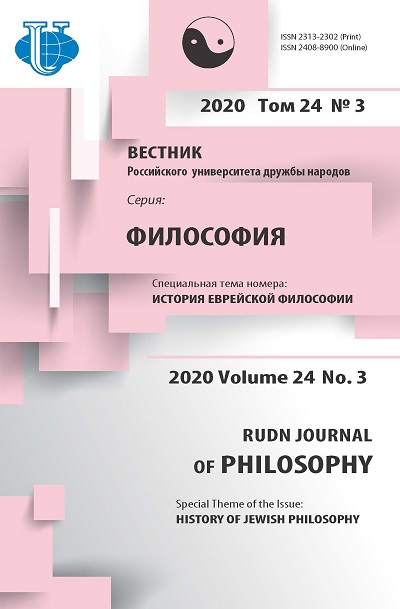Unilateral Exposure to Mass Media: Non-Communicative Person
- Authors: Chistyakov D.I.1
-
Affiliations:
- Peoples' Friendship University of Russia (RUDN University)
- Issue: Vol 24, No 3 (2020): HISTORY OF JEWISH PHILOSOPHY
- Pages: 467-479
- Section: PERSON AND SOCIETY
- URL: https://journals.rudn.ru/philosophy/article/view/24359
- DOI: https://doi.org/10.22363/2313-2302-2020-24-3-467-479
- ID: 24359
Cite item
Full Text
Abstract
The article discusses the forms and ways of the impact of modern digital media on people, groups, and society as a whole. The unilateral communication effect on a person is emphasized. The accent is made on the transmission model of information dissemination, taking into account the formation of its ritualized form. The author pays his particular attention to the status and role of an individual in interaction with mass media; provides arguments about the exclusion of a person from the communication dimension. The activity of modern digital media structures is substantiated as social “constructors of reality”. The researcher shows the technological and visual possibilities of mass media in the creation of artificial, illusory simulated models of the world perceived by a person as objective, authentic, and real. Mass media are presented as an integral social institution of modern society, operating autonomously, based on its own rules and norms, technological and content principles, conditions of network communication, digitalization, and mediatization of society. The article presents the concepts of theoretical comprehension of mass media as a self-sufficient autopoietic system of N. Luhmann, and consideration of media communication implementation as a non-communication of J. Baudrillard. The author stresses the role of spectacle and visuality in the process of TV influence on the subjects, in the construction of images and models of the world, comparable with the already available information consumers pictures of the world. The contradictory and ambiguous conceptual assessments of the activity and influence of mass media on the modern man are emphasized.
About the authors
Denis I. Chistyakov
Peoples' Friendship University of Russia (RUDN University)
Author for correspondence.
Email: chistyakov.d@gmail.com
PhD in Sociology, Deputy Director for Science, Hotel Business and Tourism Institute
Miklukho-Maklaya Str., 6, Moscow, Russian Federation, 117198References
- Chernykh AI. Media i ritualy. Moscow: Universitetskaya Kniga; 2013. 236 p. (In Russian).
- Davison, W.P. The Third-Person Effect in Communication. Public Opinion Quarterly. 1983; 47: 1—15.
- Luhmann N. Realnost’ mass media. Moscow: Praxis; 2005. 256 p. (In Russian).
- Chistyakova OV. Person in the Mediatized World of Post-Modernity: Anthropological Meanings and Social Consequences (in Russian). Person. Society. Inclusion. Part I. 2016; 26 (2): 90—98. (In Russian).
- Antonovsky AYu. Mass media — transcendentalnaya illusiya realnosti? In: Luhmann N. Realnost’ mass media. Moscow: Praxis; 2005. 256 p. (In Russian).
- Epstein EJ. News from Nowhere: Television and News. New York; 2000. P. 347.
- Toffler A. Tretya volna. M.: AST, 1999. 261 p. (In Russian).
- Baudrillard J. Requiem dlya mass media. Poetics and Politics. Almanac of the Russian-French Centre of Sociology and Philosophy of the Institute of Sociology of the Russian Academy of Sciences. Moscow: Institute of Experimental Sociology, St. Petersburg: Aleteya; 1999. 224 p. (In Russian).
- Rancière J. The Emancipated Spectator. New York: Verso; 2011. 134 p.
Supplementary files















